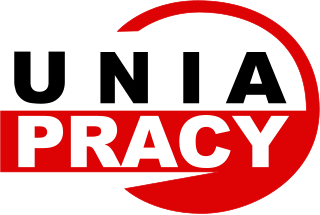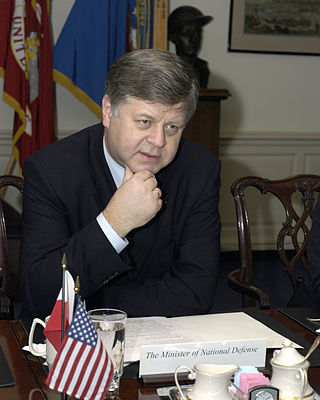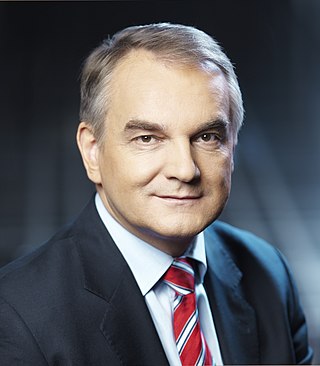
Leszek Cezary Miller is a Polish politician who served as prime minister of Poland from 2001 to 2004. He has served as a Member of the European Parliament (MEP) in 2019–2024.

The Democratic Left Alliance was a social-democratic political party in Poland. It was formed on 9 July 1991 as an electoral alliance of centre-left parties, and became a single party on 15 April 1999. It was the major coalition party in Poland between 1993 and 1997, and between 2001 and 2005, with four Prime ministers coming from the party: Józef Oleksy, Włodzimierz Cimoszewicz, Leszek Miller and Marek Belka. It then faded into opposition, overshadowed by the rise of Civic Platform and Law and Justice.

Labour Union is a minor social-democratic political party in Poland. It was a member of the Party of European Socialists (PES) until April 2022.
The Democratic Party, abbreviated to PD, was a minor social-liberal political party in Poland. It had no members of the Sejm, Senate, or European Parliament.
From 1989 through 1991, Poland engaged in a democratic transition which put an end to the Polish People's Republic and led to the foundation of a democratic government, known as the Third Polish Republic, following the First and Second Polish Republic. After ten years of democratic consolidation, Poland joined NATO in 1999 and the European Union on 1 May 2004.

Marek Stefan Borowski is a Polish politician. He led the Democratic Left Alliance (SLD) for a time and was Speaker of the Sejm from 2001 to 2004.

The Social Democracy of Poland is a social-democratic political party in Poland.

Jerzy Andrzej Szmajdziński was a Polish politician who was a Deputy Marshal of Polish Sejm and previously served as Minister of Defence. He was a candidate for President of Poland in the 2010 election.
Democratic Left Alliance-Labour Union was an electoral committee and a coalition of two Polish centre-left political parties: Democratic Left Alliance and Labour Union. At the national level, the alliance arose at the time of the 2001 parliamentary elections and continued through the 2004 elections to the European Parliament. The alliance came together again for the 2009 and 2014 European parliamentary elections.

The Greens is a political party in Poland.

Waldemar Pawlak is a Polish politician. He has twice served as Prime Minister of Poland, briefly in 1992 and again from 1993 to 1995. From November 2007 to November 2012 he served as Deputy Prime Minister and the Minister of Economy. Pawlak remains Poland's youngest prime minister to date.

Presidential elections were held in Poland on 9 October and 23 October 2005. The outgoing President of Poland, Aleksander Kwaśniewski, had served two five-year terms and was unable to stand for a third term. Lech Kaczyński defeated Donald Tusk to become President of Poland.

Grzegorz Bernard Napieralski is a Polish politician. He is an MP and was chairman of the Democratic Left Alliance (SLD) from 2008 to 2011.

Izabella Antonina Sierakowska, née Kruszyńska was a Polish politician and one of the leading and the most popular persons of the Polish left.

National Party of Retirees and Pensioners is a minor left-wing political party in Poland. The main goal of KPEiR is protecting retired seniors, pensioners and trust-busting. The current leader is former Sejm Member Tomasz Mamiński.

Waldemar Włodzimierz Witkowski is a Polish politician who is currently leader of the Labour Union, and was formerly one of the leaders of the Left and Democrats coalition, of which the Labour Union was a part. Since 2006 he is a member of the Greater Poland Regional Assembly.
The Polish Left is a centre-left to left-wing political party in Poland.

Andrzej Bohdan Celiński is a Polish politician. Until 1989 activist of the democratic opposition in Poland. Former Member of Senate and Sejm. Minister of Culture in the government of Prime Minister Leszek Miller (2001-2002).

Włodzimierz Czarzasty is a Polish politician who serves as the co-chairperson of the New Left party. He has been serving as a Deputy Marshal of the Sejm since 12 November 2019.

Jolanta Maria Banach is a Polish politician, teacher, member of the 2nd, 3rd and 4th Sejm terms, 2001-2003 Secretary of State in the Ministry of Labor and Social Policy of Poland, and 2003-2004 Secretary of State in the Ministry of Economy, Labor and Social Policy of Poland.

















